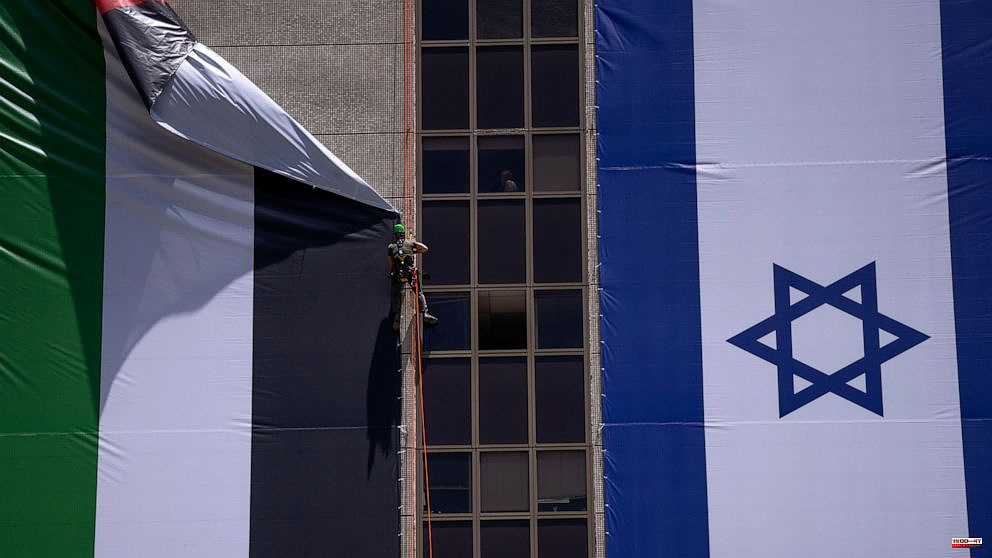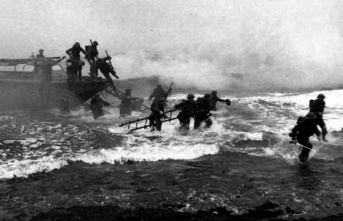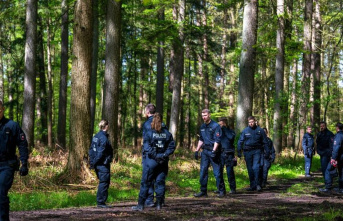JERUSALEM -- This is not a bomb, a gun, or a missile. Israel's latest threat is the Palestinian flag.
Nationalists have been furious over recent weeks' waving of the black, red, green, and white flags by Palestinians in Israel as well as in Israeli-annexed East Jerusalem.
The fracas about the flag is just one example of how hope for peace with Palestinians has diminished. It also tells us a lot about the status of the fifth Israelis who are Palestinian. Because of their solidarity with Palestinian causes, they have long been considered a fifth column.
The flag campaign is seen by Palestinian Israeli citizens as an insult to their national identity as well as their rights as minorities in Israel's majority Jewish state.
"The Palestinian flag reminds Israelis there is another country here and some people don’t want to see another country here," Jafar Farah, the head of Mossawa, an advocacy organization that promotes greater rights for Palestinian citizens in Israel, said.
Israeli authorities have taken steps to stop the Palestinian flag being hoisted in recent weeks. Last month, police at an east Jerusalem funeral for Shireen Abu Akleh, a well-known Palestinian journalist and Al Jazeera journalist, took Palestinian flags from mourners. This was reportedly in response to an order by a district chief of police to ensure that the Palestinian colors were not flown at the politically charged event.
Nationalists slammed two Israeli universities for allowing Palestinian flags at campus events. Israel Katz, a prominent opposition lawmaker, encouraged flag-waving Palestinian students to recall the 1948 war that led to Israel's creation. He said that Jews "know how protect themselves and the idea of the Jewish State."
A group that promotes coexistence between Israelis and Palestinians raised the Palestinian flag on top of the Israeli one at Tel Aviv's high-rise, only for authorities to remove it hours later.
These events led to opposition legislators pushing for the banning of waving the Palestinian flag at state-funded institutions, including hospitals and universities. Although the bill passed unanimously in its first reading, it was defeated by 63-16. However, several members of the governing coalition were not present and could try to stop the bill from moving forward.
Eli Cohen, the Israeli legislator who sponsored the bill said, "In the State of Israel there is space for one flag: The Israeli flag, this Flag," pointing to an Israeli flag behind him from the Knesset's dais. He said, "This is only flag there will ever be here," to some applause from other legislators.
Adalah, an Israeli legal rights group, says that waving a flag is not considered a crime in Israeli law. Officers can confiscate flags if they cause disruption to public order or breach the peace according to a police ordinance.
Israel's Palestinian citizens account for 20% of its population. They have had a troubled relationship with the state ever since 1948 when it was established. Hundreds of thousands of Palestinians fled or were forced from their homes during the events surrounding its establishment.
Some Israelis have been suspicious of those who remained, citing their ties with Palestinians in West Bank, Gaza Strip, and East Jerusalem, which Israel captured during the 1967 Mideast War. Last year, mob violence in mixed Jewish and Arab cities erupted, with looting of attacks scarring residents from both sides.
Palestinian citizens have made a living for themselves in Israeli society and reached the top in many spheres including education, health, and public service. For the first time ever, an Arab Islamist party is now a part of a governing alliance. However, Palestinians in Israel tend to be poorer and less educated that Jewish Israelis. They have suffered discrimination in housing, government funding, and public works for a long time.
While recent governments have made efforts to close the socio-economic gap in the region, the rights of the Palestinian nationalists have slowly been eroded, particularly as the Israeli nationalist sentiment has increased.
Alin Nasra, a student at Tel Aviv University and activist, said that it was their right to fly the Palestinian flag. "This is what distinguishes us inside Israel as a minority."
Yitzhak Retter, president of Israel's Middle East and Islamic Studies Association of Israel said that the protest against the flag was part of a feeling among nationalists and some mainstream Israelis, that they are "losing their state" to Palestinian nationalism within Israel's borders.
He mentioned previous laws which prohibited institutions or municipalities from marking Israel's Independence Day with a day of grief or the Jewish State law that sought to strengthen Israel's Jewish identity. However, Palestinian citizens saw this as a further downgrade in their status and an insult to their national identity. Israel's flag, which features a star of David and a Biblical candelabra as its national symbol, does not contain any Arab or Palestinian emblems. Israel's anthem is about the yearning for the Jewish soul.
Reiter stated that the flag "symbolizes enemy", but waving it is detrimental to Israeli sovereignty for those who oppose.
Israel used to consider the Palestinian flag to be a militant group. It was no different from the Lebanese Shiite Hezbollah or Palestinian Hamas. The flag was later recognized by the Palestinian Authority after Israel and Palestine signed a series interim peace agreements, known as the Oslo Accords.
Haaretz, a left-leaning newspaper, criticized the bill against flag. It said Israel was "obsession" because it reminded it of "the sins of the occupation" on lands that the Palestinians desire for a future country.
The battle for the flag demonstrates how far away reality is for Palestinian statehood. With the Israeli nationalist narrative becoming more mainstream, peace talks are a distant memory.
Ronni Shaked of Jerusalem's Harry S. Truman Research Institute for the Advancement of Peace said that he can recall a time when politicians wore lapelpins with both the Israeli flag and the Palestinian flag. This was back when relations between the two sides were more frosty.
He said that if we are afraid of the Palestinian flag, it means we are afraid to make peace with them.












